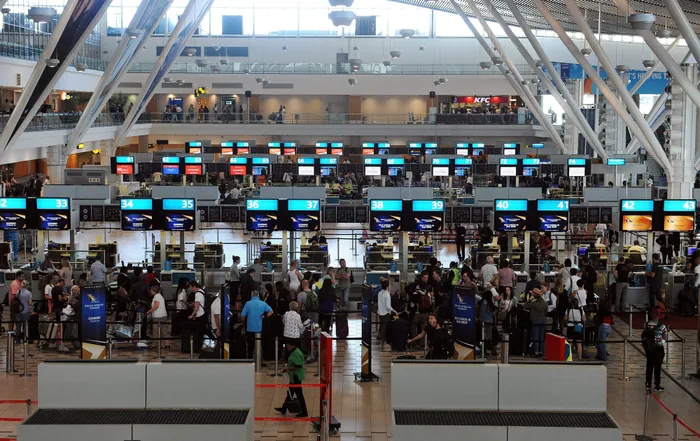
Travellers at a South African airport during peak festive season travel. Picture: David Ritchie/Independent Newspapers
In the wake of the Covid-19 pandemic, South African airlines LIFT and FlySafair are sounding the alarm over the financial pressures they face, as soaring operational costs collide with the high demand of the festive travel season.
In response to a parliamentary committee's investigation into the fairness of ticket pricing, both airlines have emphasised the difficulties of maintaining affordability for customers while grappling with substantial operational expenses.
As South Africans prepare for the festive season, concerns over airline price gouging have emerged.
Mzwandile Masina, the chairperson of the Parliament’s Portfolio Committee on Trade, Industry and Competition, accused airlines of making air travel prohibitively expensive, prompting a request to the Competition Commission to investigate ticket pricing for FlySafair, LIFT, Airlink and CemAir.
In a robust defence of their pricing models, Kirby Gordon, FlySafair Chief Marketing Officer, said they welcome the opportunity to make representations through the Competition Commission as suggested by the chair in his statement.
Gordon stated that the investigation will be interesting as the airline believes that it is pricing fairly though its competitors believe prices should be higher and the Parliamentary Committee believes that they should be lower.
“Interestingly, the Competition Commission just ruled on a matter relating to our pricing. As part of their bigger smear campaign against FlySafair, LIFT lodged a complaint that we were engaging in a practice called ‘predatory pricing’,” he said.
Predatory pricing is an act where a company actually prices below their operating costs and actively makes a loss to try and sink a competitor.
“In other words, LIFT were saying that prices were too low and should be higher. The Competition Commission ruled against them and said that our pricing was fair,” said Gordon.
He added that when it comes to how the airline’s prices work, airline seats are effectively traded on a market.
“Prices are largely set by the forces of market demand. This is why when you compare flights on a route between airlines that are leaving at a similar time, you will find them to be quite close to each other,” stated Gordon.
He said that during popular times (like now in December) lots of people will want to fly and prices will go up and this gives airlines a chance to make some profit.
“During low season there is often little to no demand and so airlines might operate flights at a loss, simply offsetting a portion of their costs with the ticket prices they can get.
“At the end, it needs to balance out to leave the airline with a reasonable profit so that they can stay in business, but not be taking advantage,” said Gordon.
He also stated that they are a low cost airline and, as such, attempt to keep their operating costs as low as possible in order to be able to keep fares low.
“We offer a simple but accessible product and we’re proud to affirm that we are generally the most affordable option – much to the disdain of many of our competitors who believe that prices should be higher,” said Gordon.
The chief marketing officer also said that it has become more expensive to fly relative to the increase of cost of living since Covid.
“There are a number of factors that relate to this and specifically its become more expensive for us to actually operate flights. In the first 6 months of 2022, for example, the price of fuel which makes up about half of the cost of our breaking flight, went up about 45%.
“We as a country no longer produce all the jet fuel that we need, it’s no longer synthesised in South Africa. We are now net importers of that fuel. You can imagine that it also has a cost implication to it,” stated Gordon.
In response to accusations of price gouging and calls for a probe into ticket prices, a LIFT spokesperson shared the same sentiments on operational costs faced by airlines in the country.
“South African airlines have thin margins and high operational costs, including costly jet fuel, aircraft leasing and airport fees, which make it difficult for many airlines to maintain profitability” said the spokesperson.
They added that fuel and aircraft lease costs make up the biggest part of an airline’s operating cost base and are USD based.
“Pre-Covid, the USD/ZAR exchange rate was consistently below R15, however, for the past 24 months the USD/ZAR exchange rate has fluctuated, on average, between R17.50 and R18.50.
“This has resulted in our cost base increasing by at least 20% due to the exchange rate fluctuations alone,” said the LIFT Spokesperson.
They stated that in addition, the price of jet fuel has seen massive increases since September 2021, peaking mid-2022 at levels more than 100% higher than pre-covid levels.
“This has also contributed significantly to the cost increases airlines have had to bear. These increases, combined with escalated fees in all other regulated cost elements and general inflation, has created a significant increase in the input cost for South African airlines,” they said.
In conclusion, LIFT’s spokesperson said that from a market perspective, traveller demand in South Africa is still below pre-Covid levels and this, along with an increased cost base, puts airlines under enormous pressure.